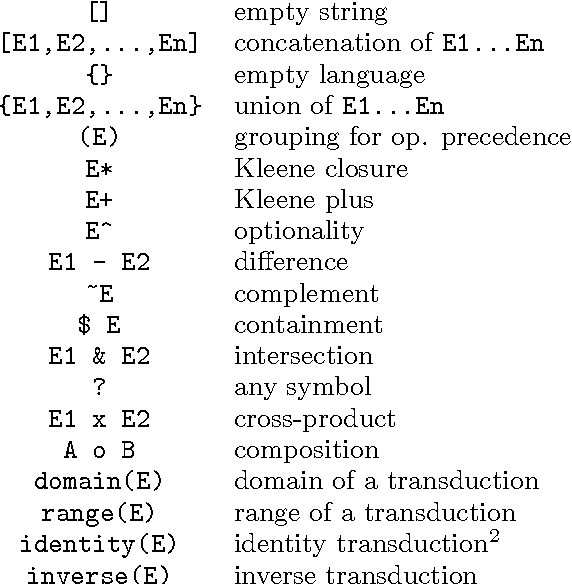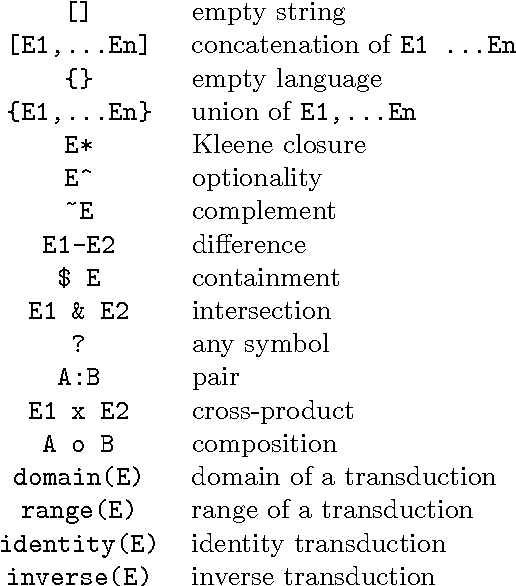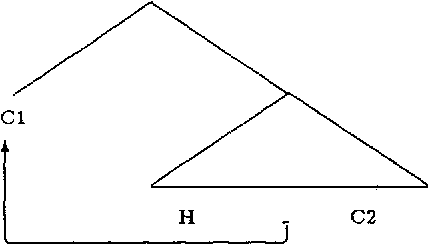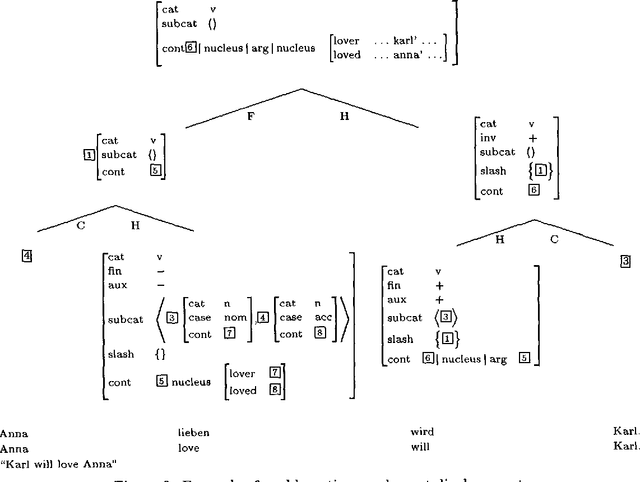Dale Gerdemann
SFB340, University of Tuebingen
Approximation and Exactness in Finite State Optimality Theory
Jun 28, 2000



Abstract:Previous work (Frank and Satta 1998; Karttunen, 1998) has shown that Optimality Theory with gradient constraints generally is not finite state. A new finite-state treatment of gradient constraints is presented which improves upon the approximation of Karttunen (1998). The method turns out to be exact, and very compact, for the syllabification analysis of Prince and Smolensky (1993).
Transducers from Rewrite Rules with Backreferences
Apr 15, 1999
Abstract:Context sensitive rewrite rules have been widely used in several areas of natural language processing, including syntax, morphology, phonology and speech processing. Kaplan and Kay, Karttunen, and Mohri & Sproat have given various algorithms to compile such rewrite rules into finite-state transducers. The present paper extends this work by allowing a limited form of backreferencing in such rules. The explicit use of backreferencing leads to more elegant and general solutions.
Term Encoding of Typed Feature Structures
Dec 22, 1995



Abstract:This paper presents an approach to Prolog-style term encoding of typed feature structures. The type feature structures to be encoded are constrained by appropriateness conditions as in Carpenter's ALE system. But unlike ALE, we impose a further independently motivated closed-world assumption. This assumption allows us to apply term encoding in cases that were problematic for previous approaches. In particular, previous approaches have ruled out multiple inheritance and further specification of feature-value declarations on subtypes. In the present approach, these spececial cases can be handled as well, though with some increase in complexity. For grammars without multiple inheritance and specification of feature values, the encoding presented here reduces to that of previous approaches.
* 12 pages Latex2e, ecltree, epic, eepic, tree-dvips
Off-line Optimization for Earley-style HPSG Processing
Feb 07, 1995

Abstract:A novel approach to HPSG based natural language processing is described that uses an off-line compiler to automatically prime a declarative grammar for generation or parsing, and inputs the primed grammar to an advanced Earley-style processor. This way we provide an elegant solution to the problems with empty heads and efficient bidirectional processing which is illustrated for the special case of HPSG generation. Extensive testing with a large HPSG grammar revealed some important constraints on the form of the grammar.
* 7 pages, LaTeX (avm.sty, eaclap.sty and tree-dvips)
The Correct and Efficient Implementation of Appropriateness Specifications for Typed Feature Structures
Aug 02, 1994Abstract:In this paper, we argue that type inferencing incorrectly implements appropriateness specifications for typed feature structures, promote a combination of type resolution and unfilling as a correct and efficient alternative, and consider the expressive limits of this alternative approach. Throughout, we use feature cooccurence restrictions as illustration and linguistic motivation.
* 5 pages, postscript, compressed and uuencoded (uudecodes to gerd_king.ps.Z)
Parsing as Tree Traversal
Jul 29, 1994Abstract:This paper presents a unified approach to parsing, in which top-down, bottom-up and left-corner parsers are related to preorder, postorder and inorder tree traversals. It is shown that the simplest bottom-up and left-corner parsers are left recursive and must be converted using an extended Greibach normal form. With further partial execution, the bottom-up and left-corner parsers collapse together as in the BUP parser of Matsumoto.
 Add to Chrome
Add to Chrome Add to Firefox
Add to Firefox Add to Edge
Add to Edge